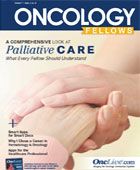Publication
Article
Oncology Fellows
Why I Chose a Career in Hematology & Oncology
Author(s):
My path to becoming an oncologist was a little different from most, but like so many others, I was inspired by a practicing physician who showed me what medicine truly can be.

My path to becoming an oncologist was a little different from most, but like so many others, I was inspired by a practicing physician who showed me what medicine truly can be. While in college, I worked during the summers as a medical assistant for an orthopedic surgeon in an effort to reduce my ever-increasing educational loans. Upon completing my bachelor’s degree in Spanish literature and language, I continued my work in medicine as a medical assistant and interpreter in an urgent care office close to home. While there, I developed a true love for medicine and frequently wished that I were the physician treating patients and making the treatment decisions that would set them on the path toward recovery. I therefore decided to apply to a master’s program that offered the courses I needed in order to apply for medical school.
While enrolled in the master’s program, I worked in a hematology and oncology clinic. On the first day in that office, I knew where my medical career would lead. During the first patient visit, I was amazed when the oncologist spent most of it discussing the upcoming birth of the patient’s grandchild and the health issues of the patient’s wife. He started each subsequent medical visit with conversations like these, which indicated to me how well he knew each of the patients.
I learned over the next days and weeks that the majority of his conversations with patients were centered around their personal lives rather than their medical health. He knew the patients so well that he could tell how they were feeling by their tone of voice, their facial expression, or even slight changes in mannerisms. There is a true connection between the patient and the doctor during such a challenging time in the patient’s life. This is exactly what I wanted. I decided within days of working with this oncologist that I would follow the same career path in hopes of building these kinds of relationships with my own patients.
Now, 10 years later, that is exactly what I have done. I am a hematology and oncology fellow, and my work life is exactly how I imagined it would be. When I see Mr Harris walk down the hall slightly slower than he walked during each of his last 8 weekly visits, I know he has gotten weaker. I see Mr Edward with his shoulders slightly hunched and his head hanging down and know he is still struggling with the recent death of a grandchild. From the big smile on Mr Ray’s face, I know that this week he is able to concentrate more on his grandson winning a cross-country meet than on the pain that is a daily part of his cancer.
In so many ways, I am more capable of treating these patients because I truly know each of them as a person. I was told recently by a mentor that I should know my patients well enough for me to spend the majority of the visit speaking with them about their personal and social lives, because each personal story my patients tell me gives me a clue about any changes in their cancer, their pain, or the side effects of their treatment.
I am often asked, when I say I am an oncology fellow, why I chose such a gloomy field of work. The truth is that, although it can sometimes be heartbreaking, I don’t think it is sad. It is true that some of my patients do not survive for years, but I am still able to spend the majority of my time as a physician feeling joyful about the time I have with them. I am able to get to truly know my patients and help them through a time that is likely one of the most difficult and vulnerable in their lives. I could easily treat a patient in the short term, as is the trend in some other specialties, or treat a patient so infrequently that I cannot bond over stories of their current and past life experiences. Then, however, I would miss out on the true joy of medicine. For this reason, I chose hematology and oncology, so that I can truly treat a patient and not a disease.










